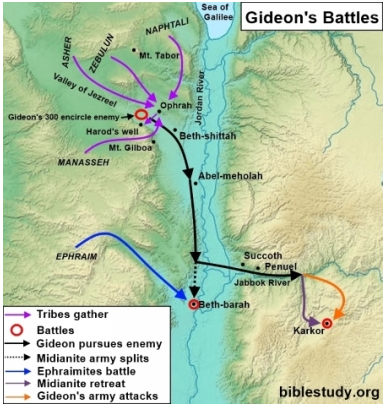Probably not. There's a handy map and explanation over on biblestudy.org.
The battle
There isn't a way to return from Succoth through Peniel that wouldn't have then had Gideon doubling back (and losing more time/food) to get back to Ophrah. We can't know for sure due to the uncertainty around the location of the 'Pass of Heres' referenced in v13, but the inference of the text seems to be that the Midianites originally took the direct route but Gideon surprised them by taking a longer route and circling back to attack them from the East:
"Gideon went up by the route of the nomads east of Nobah and Jogbehah and attacked the unsuspecting army." Judges 8:11

The Midianites would presumably have set lookouts or sentries along the route they had travelled, but would not expect an attack from behind them, and so it was easier for Gideon's small force to approach from this route, surprising the army and causing them to scatter: consider that ~89% of their army had already been destroyed, the rest were likely tired and low on morale/supplies, and those who remained were probably mourning and just wanting to go home at this stage.
The return
It seems likely that the 'Pass of Heres' would simply be the most direct route that the Midianites originally took in the first place, rather than taking a third (less direct) route home after the battle. Note that the men are already recorded as being exhausted much earlier in the account (8:4).
The text does list the consequences for Sukkoth before Peniel, but this doesn't necessarily mean this was the chronological order of events. Perhaps Sukkoth was listed first because it was the first that Gideon had threatened, or perhaps because it was the more significant or memorable consequence.
On balance it seems more likely that the army took the most direct route and the events were not recorded chronologically.
What happens next?
Following this sequence, the text seems to jump many days and miles West back to Israel, where the people respond to Gideon's victory:
Judges 8:22 The Israelites said to Gideon, “Rule over us—you, your son and your grandson—because you have saved us from the hand of Midian.”
Again, this doesn't tell us much about where or in which sequence these events happened, and the order doesn't really affect our understanding of the events, but could affect the storytelling. If Gideon punished the Midianites and then punished the Israelite towns, it would feel awkward to skip from Gideon killing an entire Israelite town to being asked to rule all Israel.
So we can't know for sure what Gideon's path was, but the simplest explanation is that they took the easiest route and the consequences were recorded in a different order.
